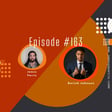Introduction of Martin Salama and the Warrior's Life Code
00:00:00
Speaker
Right. Hello, everyone. Welcome back to the show. Today we have another special guest, Martin Salama. Yeah, let's get this started. Can you tell me a bit about who you are?
00:00:12
Speaker
what you're about and sort of what your message is overall. Sure, absolutely. Well, first thing is, thank James, thank you for having me on your show. I'm excited to be here with you and explore some things with you. So as you said, my name is Martin Salama. I'm known as the architect of the Warrior's Life Code. And for me, life is an acronym for what I do everything. Live incredibly full every day.
Defining Happiness and Meaning in Life
00:00:35
Speaker
And that's a mixture of being happy and having a meaningful life. Because you could be happy without being having meaning in your life, or you could have meaning in your life and not be happy. So it's a maed mixture of both. Happiness to me is self-love, self-care, even selfish.
00:00:53
Speaker
Whereas meaningful is selfless. What are you doing for others? What impact are you making on your world, on your community, on the on the person next to you?
Mindset: From Lack to Abundance
00:01:02
Speaker
So it's a mix of both. ah Live incredibly full every each day. And so that's what my my coaching is about. And that comes from many years of my not living that way and creating a program around that.
00:01:18
Speaker
and expanding it as I go along to other things as well. But mostly it's about helping people shift their mindset from lack to abundance, or as I like to say, from self-conscious to self-aware. So what's the difference between self-conscious and self-aware?
00:01:36
Speaker
That's a great question. So many people think that they're self-conscious only to find out after talking to me, they're kind of self-aware only have to finding out talking to me a little bit. They're more self-conscious than self-aware. So I came out with a card deck as part of my coaching program. And if it would be okay, I can just read straight from the card.
00:01:56
Speaker
what the difference between the two is. Please, please. cool So self-consciousness comes from a place of negative energy, guilt, conflict and doubt. Self-conscious is more outward directed. It's being more concerned about what others are thinking of you and how the situation is going to affect you.
00:02:16
Speaker
you probably react to uncomfortable situations instead of respond. When you're self-conscious, you're questioning your decisions, you're second-guessing yourself, allowing other people's opinions and judgment to sway your own judgment.
Martin's Journey: Overcoming Personal Challenges
00:02:30
Speaker
Self-consciousness comes from a mindset of lack complaining and blaming. Self-awareness comes from a place of positive energy, acceptance, contentment, and self-assuredness. Self-awareness is more inward facing. You have an accurate and realistic understanding of how you are responding to situations and how you feel about things. It enables you to approach interactions and circumstances from a more balanced, richer stance.
00:03:00
Speaker
Self-awareness comes from a mindset of abundance, taking responsibility and gratitude. So how did you shift yourself from being self-conscious to self-aware? Well, that's a great question, James. And I'd love to say that it happened overnight, but it was through going through many life challenges of my own,
00:03:21
Speaker
especially starting in 2008 when the financial world fell apart, I lost everything and I had to restart. And it took me about a year to get myself out of a depression, which looking back now was obviously a situational depression based on the situation of losing everything. Eventually my house was foreclosed. I had my cars.
00:03:43
Speaker
repossessed. That's how bad it was. And before that, I was on the top of the world. I was on a prop making a project that was going to be a ah fantastic moneymaker until everything fell apart financially. And I was a victim of the financial crash. So I was down. I really was down. And it took me, like I said, a year to come through that and come to say, okay, now what am I going to do with myself? And decided to become a life coach.
00:04:07
Speaker
because i've been always involved in community events community organizations and as a leader i was always coaching people to say you could do more just give yourself an opportunity and i show them how they can figure out what their potential was. And just before i was about to start life coach training but two months before is my twenty fourth wedding anniversary and my wife gave me a very interesting wedding present anniversary present.
00:04:31
Speaker
She said, I want a divorce. So I was like, oh man, why does everything keep happening to me? I decided to go through coach training anyway. I was down. I was really, i just as I started to pick myself up, I got down again. I was like, I got to get through this. And I went to coach training and that first weekend helped me understand that I can be whoever I wanted to be. I didn't have to be who I thought I had to be.
00:04:57
Speaker
And that started my journey for me to understand that I was always living in that mindset of self-conscious, trying to please everybody, trying to do everything, trying to prove myself, and feeling that guilt and those things I talked about in the negative side. And it took me a little while to get through and get to the point where I didn't care what other people think, in a bad not in a bad way. I learned that I was a people pleaser. And as a people pleaser, all you do is care what everybody thinks.
00:05:25
Speaker
It was about, my understanding is about what I care about, what I think, and how or where I am, and start to respond instead of react. Can you maybe give an example of a time where you actually Responded and said react and kind of what is signs of the difference between that because I think in modern-day social media Especially a lot of people like to react. Yeah, would that be part event something crazy going on? You probably see it all Absolutely. It's an easy way. I can give you a ah situation that happened after my divorce a couple of years after my divorce My son was getting married
00:06:02
Speaker
And we have a ah tradition in my community. I come from an Orthodox Jewish community in Brooklyn, New York. And we have a tradition in my small community that sometimes before the wedding, the Saturday before the wedding, we go to synagogue and afterwards there's a lunch for the bride and groom.
00:06:19
Speaker
So i was under the impression that we were gonna do this and i was living in new york at the time in my my ex and my children were living in new jersey and they would come in every once in a while and all that so this is the weekend before the wedding and my son comes home comes to new york after the wedding and he says dad i'm so sorry mom made the lunch and everybody was there and you weren't there. She didn't invite you. I feel so bad. I said, the old me would have freaked out on my son, would have picked up the phone and freaked out on my ex. Instead, the new me one said, Caesar, it's not you. It's okay. Thank you for telling me. Now I had a decision to make. What was I going to do about this? right Like I said, the old me would have just freaked out on everybody and just took it out on everybody. But the wedding was two, three days away.
00:07:07
Speaker
And what would I have done if I freaked out on everybody? It would have put a shadow over the, a pall over the wedding. So I decided that I'm not going to do anything until after
Coaching Program for Financial Success
00:07:18
Speaker
the wedding. And it took a lot of, a lot of self-control, but I had gotten to the point where I understood if I, mo if I acted, reacted in that moment, I was being self-serving. I wasn't taking my son into account, my future daughter-in-law, my family, my daughter-in-law's family,
00:07:38
Speaker
even my ex. So I waited until a few days after, called her up and I said, this is what you did. This is the message you sent to my children. This is that I don't care that I don't matter. And that whatever happens to me doesn't, it doesn't care. And I was ah i was angry, but it was a controlled anger. And I ended the conversation by telling her, thank you for divorcing me.
00:08:01
Speaker
And for me, that was a closure at that moment. So here I was, I had an opportunity to freak out and I had every right to freak out right there on the spot, but I had to learn that it wouldn't serve anybody if I did it at the wrong time. Excellent. And to speak more on this, you know, do you think as you move forward in life now, these skills made you into a better teacher as well? Like, um,
00:08:31
Speaker
What is sort of this now, this this business you have now, this seven-figure warrior program? How is this now kind of built into that whole philosophy and mindset? Is this growth a part of this now? Absolutely. Such a great question, James. Thank you for asking that.
00:08:49
Speaker
So I'm in a program. I started a program a few months ago, this seven guaranteed seven figure warrior program where I help mostly coaches and consultants, but other entrepreneurs as well that fit into the model. I help them get to a seven figure business within two years guaranteed. So how do I do that? Well, I do that by helping them understand that for a coach to get to a six figure business, you need to have the right systems.
00:09:18
Speaker
Right? That there are the right systems in place. But to go beyond that, to get to the seven-figure level, you have to have the right mindset. So I build in the system in the first part of it and the mindset right from the beginning. The system is the nuts and bolts of getting everything in the right way.
00:09:35
Speaker
The mindset is understanding how to shift your mindset so that you feel that mindset of lack, that mindset of self-awareness instead of the mindset of acuity of abundance and self-awareness instead of lack and self-consciousness. So in my program, you're getting both sides he fed into you so that you're getting the nuts and bolts and understanding that you can do it. You have it in you to build the business. So it's building that self care, self understanding and self confidence. And then the third part that comes in is you have a seven figure business. How about going further with it? How about solidifying it? You do that by becoming scalable. And to me, scalable means is that you find other people to do things you shouldn't be doing.
00:10:25
Speaker
And I read a great book of over the last year. I've been doing this for a while, but this book, it's called who not how I didn't write it. I'm not making any money on it. Right. It says, find the people around you to do the things you don't want to do, or you don't know how to do. We'll find the who's to do those things better, faster, and more efficiently than you. Okay. So who were the specific who's in your life as you would phrase it? Absolutely. So.
00:10:56
Speaker
I'd like to think that I know what I'm doing on the internet, but when it comes to building a website and doing the CRM, you know the customer retainer and all that stuff, I don't know anything.
00:11:08
Speaker
So I found people around me, one of my best people that works with me, she's a fractional COO. Why is she a fractional COO? Because she doesn't work for me. She has her own business. she has us She does this for a bunch of people and she takes care of the ah operating. A COO is a chief operating officer. So she's a fractional COO. So she comes in and does work with me.
00:11:33
Speaker
and so helps me set up things behind the scenes that I don't know how to do. And if I did know how to do, I'm staying out of my lane of genius. My lane of genius is speaking and coaching and helping people get further in their business by moving them where they want to go.
00:11:51
Speaker
That's just one area. And then I go further, have somebody else that takes care of my social media. They run it by me and they go, what do you think of this? And I have the final say, but they build it and they say, can you write me, can you do a video for me this long talking about this subject? And I'm like, yeah, I can do that. And then they do all the magic behind to make me look good. That's excellent. And you know, it reminds me of this concept of delegation.
00:12:17
Speaker
You know, you pass on certain things to the people so you could focus on what you specialize in. And, you know, I think that's all really, really important. And my next question is, now that you understand yourself so well,
00:12:38
Speaker
What now is your business? Are you now guiding and advising other people now to develop financial wealth, develop financial standing by cultivating these skills and these virtues that you've uncovered over It's really two-pronged. It's the financial wealth and the financial flexibility, but it's also, I believe that what's also very important in my program is helping people make an impact in the world. It's not all about the money. The money is good and it's important, but what are you doing out there? That comes to the other side of the meaningful part. What are you putting out there? How are you making an impact in the world?
00:13:18
Speaker
So by helping them develop what they're good at. Right. And I'm very intuitive in that way. Sit with me for a while for a short time and I can help a person figure out where they're going and why they're going there with their help asking questions. That's what a coach does. It's really in them, but helping them cultivate it so that they can build their program to make an impact and make money. Excellent.
00:13:44
Speaker
And so your goal essentially is not money, but it's sort of to help them achieve a sense of fulfillment, a sense of fulfillment in themselves and help others find that fulfillment within themselves. Okay. I'm very interested to know now let's, uh, let's start figuring out. Okay. So what what are some of your best success stories? What are some of the people that you've changed that may have riveted you or, you know, influenced you the most and made you feel the most proudest of what you did and sort of. What type of joy do you get? Oh, you know, it's that moment. And, and, you know, I, I wasn't always doing, this is a new program for me. I started this in the first quarter of 2024 and I'm, and these people are now starting to see the beginning fruits of what they're putting in. But for years I was helping other people with that mindset, mindset shift.
00:14:38
Speaker
OK, so I've had people come to me and say I in the past I thought I was just a vehicle to help somebody else be happy and that was fine in their business. Now I want to be happy and because of what I've learned for you, I am happy and I'm able to
Client Transformations and Success Stories
00:14:52
Speaker
help others as well. But to give you an example of somebody that's in my program right now, she came to me and she's like.
00:15:00
Speaker
I have this great coaching program that I want to help other women through domestic violence. She says, but I really want to help coaches, develop coaches to help other women with theirest amount domestic violence. So after talking with her, I said, so you basically have two streams of income that we can develop for you. The first stream of income is coaching women to get through their domestic violence issues.
00:15:28
Speaker
The second stream of income is because not everybody's going to want to do this next stop, but some will, where they want to coach other women to get through domestic violence. So we came through and she says, I want to help 50 women in 50 states to start.
00:15:45
Speaker
I want to get 50 women out there in 50 states. That doesn't mean if she gets two or three women and in one state, she's going to stop there. But that's her mindset to get, she wants to spread this message of helping people, women get through domestic violence. So we developed a program using her program and then my program overlaying it on what we're doing to help them get to the point where they have an impact with helping domestic violence, but it's okay to be profitable along the way because people get into that thing of, well, if you're helping people, how can you be profitable as well? And that's a mindset that you've got to get out of your head. It's that old thing of what's in the Bible is, you know, the love of money is, you know, the, you know, what, what is the thing?
00:16:33
Speaker
Also, I went out of my head. Something about the root of evil is not being favored and the poor being favored and the meek. Exactly. um Exactly. You know, ah it's money is the root of all evil. and That's not the right saying. It's the love of money is the root of evil. If you're greedy, that's a bad thing. Money is not a bad thing.
00:16:55
Speaker
right Money can do a lot for people, but I like the idea of helping them have an impact. and This woman is going to have an impact on a lot of people with his program that she put together. so When do we talk about this too, what about this idea of sort of helping them to avoid this desire to not ask for anything in return? Where do you think that sort of stone stems from. Do you think that actually can be a form of self-consciousness? I think so. I think, you know, it's part of that. How can I charge for this? How can I ask someone to pay me for this? And it it has to do with understanding your own self-worth. And that comes with the self-awareness and the self-care is that if you have a service that you know can help people,
00:17:47
Speaker
By not helping the people because they're afraid to charge, you're doing a greater disservice. That's fascinating when we go into disservice. Do you think it's just a disservice to you? Or interestingly enough, do you think it could be a disservice to also the people you're helping as well? It's definitely a disservice to you, but it would be a disservice to the people you could help because you're not willing to charge them. So you're afraid to go out there and charge, so you're not even helping those people.
00:18:16
Speaker
because of fear of being judged for charging so much money or whatever it is. But if they if you're going to shift their lives, how much is that really worth? it's It's priceless. Knowing that I have a gentleman like that that, Josh, who now looks to me and says, you changed my life. it's To him, it was worth 10 times, 100 times what he paid me because of where he's taken him in his life.
00:18:44
Speaker
I mentioned Josh when we spoke about a woman there. So, so is Josh a different person? Then I mentioned that said he felt like he was a vehicle for other people's happiness. This other woman, her name is Andrea. So when you help this other woman, how did that sort of make you feel determined? You know, what type of joy do you sort of get from something out of, in the sense, how does that joy sort of transpire to Maybe you feel it fulfilled and do it all. feeling When we're on, what I do is I do one-on-one coaching in a group setting, right? So when we're on our group coach calls and she's telling me the if the the the the success she's having. And when it was it was funny because when she first heard about my program, she says, are you going to try to change my program with what I'm doing, change my coaching program? I said, I can't answer that question. I don't know your program, right?
00:19:40
Speaker
Because she says, too many people come along and they tell me they want to change my program and they don't even know what I'm doing. I said, exactly. I can't, I can't do that. I said, but what I can say is if there needs to be changes, we'll make those changes together. So as she got involved and she saw that my business model can be fit into what she was doing, she was like, they thank you for telling me I don't know. Instead of saying yes or no.
00:20:07
Speaker
I said, we can figure this out together. so For me, it was my satisfaction is that she had the trust and belief that i was that what I was saying could really happen. and Now, she took a leap of faith and it's paying off for her because It's starting to pay dividends. She's going out there. She's showing it to women. They're coming back and saying, I love what you're putting together here. I want to be involved in that. So for me, the sensor, especially with a woman who's out there spreading a message about helping women who want to free themselves from the domestic violence that they have in their lives.
Reciprocal Nature of Coaching
00:20:45
Speaker
That's an unbelievable feeling for me. So do you think there were other clients that you worked with that may have actually taught you something about your yourself? Absolutely. No question about it. I'm learning from my clients every single day. If you ever get to the point that you don't think you'll learn from anybody, then life is starting to decline.
00:21:09
Speaker
I'm always learning from Josh, from Andrea, from Jason, from Roberta. Every day I learned something from one of my clients because they'll tell me something that I'll see in a new way. And I'm like, I never thought of it that way.
00:21:25
Speaker
There's always, because it's not me lecturing. It's me yeah sitting down, coaching them, learning about them so that I can help them. And as a result of learning about them, they say things that end up helping me as well, especially in the coaching world, because most of the coaches out there that I deal with, ah by the time they're getting into my program, they vetted me. I vetted them. I know I'm getting into a relationship with somebody that's got value.
00:21:54
Speaker
and They're coming into a relationship with me that will give them value as well. I'm excited to learn from them as they're learning from me. so as just kind As we kind of build into this now, what is the program? Why is it called the seven-figure warrior program? That sounds like a very specific name. What was the construction of that name? What was the thought process in making a name like that?
00:22:23
Speaker
Yeah, it's a great question. So in 2008, when the world financial world fell apart, I lost everything, right? And I had to rebuild my life. And in that process, I got divorced. And i that just knocked me down as well. And that's when I decided to become a life coach. Right before my divorce was, my wife came to me for the divorce. I decided I was going to try something new and become a life coach.
00:22:47
Speaker
and I went into that and it was the the turning point of my life going there because i started to understand who i was for the first almost fifty years of my life and that i was a people pleaser and that i took everything personally and that i had a short temper and i need to always feel recognition.
00:23:07
Speaker
And I started to release these things from me, and that was all part of my self-consciousness that we talked about about at the beginning, and understand that I was trying to help everybody else without taking care of myself.
Development of the Warrior Philosophy
00:23:19
Speaker
So that's how it started. And then a few years later, I started out first as a divorce recovery coach. Makes sense. I recovered from divorce. I wanted to help others as well.
00:23:30
Speaker
And that evolved into my coming up with the idea that I want to help people enjoy life so that they can live incredibly full every day. That's my acronym life, live incredibly full every your day, happiness and meaningful lives. And then I said, okay.
00:23:47
Speaker
I watched as things started to change for myself. And I put the program, I'm putting the program together. I started dating. I found a woman. We got married. We've been married for almost six years. Now it comes to 2020. Something crazy happens in the world in March of 2020, James. This word called COVID comes into our world. You remember that? Yes. Right. So we all become locked in our houses. And then they're like, it's only gonna be two, three weeks.
00:24:18
Speaker
I'm like, okay, we'll see what happens. Two, three weeks, we're still there. Two, three months, we're still there. I turned to my, eye and me, I'm going out every day. I'm putting on the mask. I'm even putting on gloves. I'm going shopping to the supermarket, whatever. My wife is now working from the house. The kids are learning from the house. Her children, my children, ah two of them are married. Another one is 30 years old on his own. Another one lives with the her mom most of the time.
00:24:42
Speaker
But we're good. All right. And then all this is happening. And I tell my wife, I live in New York, Brooklyn, New York. Well, let's go to Manhattan. Let's go to the city. We drive to the city. And if you know anything about driving in New York City to go down Fifth Avenue could take you a long time.
00:24:58
Speaker
Well, that day I was able to go straight down Fifth Avenue without missing a traffic light. That's how few cars were out. That's how few people were out. And I looked around and I was like, where is everybody? What is everybody so worried about? And I realized that the 10, 12 years before that, losing all my money, going through a divorce and other things had gotten me to understand that whatever comes my way, I can get through it.
00:25:21
Speaker
Because instead of things happening to me is how I felt after my divorce and after losing everything in 2008, which is me blaming everybody else, things happened through me. I'm responsible for what happens in my life. Right. So I got onto Facebook and I said, guys, I get it. I know why you're worried because you're not seeing the big picture. Let's get together and let me show you how to go from being a warrior to a warrior. So that's where my warrior comes in. So now I help people understand that you can get through anything because if you've gone through adversity and you've come through the other side, you're a warrior. So I put the warrior into this program as well. it's So a warrior is essentially someone who has what you would say, grit. Yeah. They've gone through the, they've gone through the fires and they got burned and they figured out how to get better as a result of them and gotten stronger.
00:26:16
Speaker
So how did you begin to, how do you begin to teach someone this warrior philosophy? and And I think the next thing is a sort of this idea of guaranteed seven figure components. I know we're finishing through the name here, but I'm just, I just want to get every aspect. That's what we're here for. So first thing is I helped them understand that you have to have the right mindset for yourself.
00:26:43
Speaker
That's where the warrior comes in, building your mindset to go from lack to abundance, right? From self-conscious to self-aware. And then I bring in the nuts and bolts at the same time of a business. So how, why do I guarantee it? I'll tell you why, because I'm going to get to the seven figures.
00:27:01
Speaker
okay But it's not those kind of programs that I've been involved in in the past that I've ordered to where they said, oh, this is going to be a done for you or a done with you program. And what I found them to be, James, they were done to you programs.
00:27:16
Speaker
because they take your money and they say, oh, watch these videos and watch, do these things. And everything's going to be hunky dory and it's gold're going to be great. But they don't tell you that there's a lot of things that you don't know how to do. And if you don't know how to do it, you're not going to succeed. So I said, I'm going to put together a program where it's comprehensive and it's we hold a hand and we do these one on one in group settings so that the other people that are listening could learn as well as we talked about earlier.
00:27:44
Speaker
You could always learn from other people in the group. They may have a question that you didn't think of that now gets you going down another way and thinking of a different way. So the nuts and bolts are there. The mindset is there. Now, how do I guarantee it? Because I use something called the risk reversal strategy. I tell them the cost of my program is this, but I'm only going to ask you for 12 and a half percent now, only 12 and a half percent.
00:28:14
Speaker
and then you don't pay me again until you get financial results from the work we're doing together. So I'm not just coaching them on information, I'm coaching them to get results.
00:28:26
Speaker
and Along the way, they're also going to get the infrastructure that they need for the website and some pages that are templates as well as putting together for them a done for you workshop so that they're successful. Each thinks they come along as they're going and we show them how to find their right fit client and their right fit audience. so It's a risk reversal because I'm telling them I'm putting the risk on me because I'm not successful until you're successful. And then when you're successful, how much do you want to pay me to keep being even more successful? And there's a limit. I'm not asking for you to pay me forever. When you hit the numbers, when we get to the million dollars, you're done. You pay me the last payment, but we're still partners together in different ways because I want to build relationships with these people to help them go to seven figures, eight figures, and whatever.
Traits of Ideal Clients and Coaching Challenges
00:29:19
Speaker
So, and then we come up with different things, but it's right now getting them to seven figures. And I can do it within two years. If they follow what I tell them to do even less, but I build in a little bit of a, who knows life may get in the way. One of my clients, a month or two months after he signed up, had an appendicitis attack. And as a result, he's had other health issues come along. So I'm contacting him when you're ready, I'm here for you. And he's doing it at his pace.
00:29:50
Speaker
Hopefully, he'll feel well enough that he can start to accelerate. Excellent. And when it comes to, you know, this idea, you know, the next step now, which is bring these clients in, what would you consider your ideal client or would you consider a client that is not ideal at all for this? That's a great question. To me, an ideal client is someone who understands as a coach that they have something to offer and they're not sure how to get it out there. But they're also willing to do the work and willing to take an understanding that the way they've been doing things maybe isn't the best way and that it's okay to try things and see how they do it. Don't wait for the the flight the plane to be built to start flying. The client that i that i that is not ideal
00:30:44
Speaker
are a couple of different ones. One who thinks they know it all and not willing to listen, not willing to learn, not willing to grow. And one who's afraid to take a chance because they think they may fail. You don't learn if you don't fail. Failure is what I look at as a way of saying, I know, and look, look at the look at Thomas Edison. He had a thousand ways of how not to make a light bulb.
00:31:09
Speaker
He said, they said you failed a thousand times. He goes, no, I figured a thousand ways how not to make a light bulb until I found a way to make a light bulb. So it's about willing to take and a risk, but in the right type of risks. And if someone who's not willing to stretch themselves, they're already telling me they're not willing to do the work for themselves. So.
00:31:31
Speaker
When it comes to working with your clients, most of the time when I'm listening to you, uh, you do a lot of one-on-one coaching. I'm not really hearing too much, but too much, uh, discussion on group coaching. And again, that's just my right. right So I don't do a lot of one-on-one coaching. I do a lot of group coaching one-on-one coaching in a group setting. Oh.
00:31:54
Speaker
okay Right? So they're all there. They come with whatever they have questions, they've got issues and everybody else is in the call as well. Cause we're in a safe space. And Andrea has got a question she's working through. Jason is watching and listening and he goes, Oh, I didn't think of it that way. Wait a minute. And then it's his term. I got a question based on what Andrea did. That's one-on-one coaching in a group setting. Now um I'm, I'm,
00:32:24
Speaker
maximizing my time and miniizing maximizing my efforts while minimizing my time. and I teach the same way for them. yeah that's That's really interesting because it shows that you really do care about them because when you were speaking to me about them, you were speaking to me as if they were all individuals and you're all dealing with them each in their own individual block. You weren't talking about it like they were just a group of people. so That really shows that You really do put a lot of concentration to these people. They're like my children. You you know, I care about each one of them. That's why I say they vet me. I vet them. I want to make sure who's ever going to come into this program. The chances of success are great because we understand each other. We've clicked and they're willing to do the work and I'm willing to give them everything I've got of me because they're willing to do the work. Okay.
00:33:23
Speaker
When it comes to that willingness to do the work though, how do you see that? How do I see the work? How do I see the willingness within them to actually put the work in? Well, with them, which I call a strategy session. Okay. And the first part of the strategy session is understanding who they are now and who they want to be. Before I even talk about my program, I'm qualifying them for themselves as well as for me.
00:33:54
Speaker
I'm going through a series of questions and I build a a a mind map on their questions, on on the my questions and their answers to see how much do they really want what they say they want and how coachable are they and what are they willing to do. I'm not asking them to put in 40 hours a week. I'm asking them to put in a few hours a week so that they can get where they want to go by following a proven system that I've learned from someone else and cultivated to my, to be on the, my way of doing it, which I've customized for me as a better way of putting it and my clients. So when it comes to your clients, do you have a max number of people that you work with and
00:34:43
Speaker
When it comes to the scalability of your business over time, do you think you'll just push out forces or have them work on the side? Or is it always going to be the same style? You really have great questions, James. I've i got to tell you, I'm really impressed with your questions that you're asking. So it's going to be a mix. As I start to build my group, number one,
00:35:08
Speaker
There's not going to be a limit because I know that there'll be different people at different levels that, for example, they may be at the figure out who their right fit client is. They'll be in one group.
00:35:20
Speaker
okay They may be at blueprinting, they'll be at another group level. They may be at validation, they'll become another group. And I'll have multiple meetings going on for those specific people. That's number one. Number two, as I'm developing these, I'm recording my calls so so that if someone a new comes on, oh, watch these calls.
00:35:40
Speaker
and get an idea and then come on to the coaching calls based on what you heard on the teaching calls so that you can come to the coaching calls with your questions and with your work done so that we can help you move forward. So that's where the scalability comes in. And if I get so big, the people that are going to also do what I do will be very, very well trained by me, and they better have a lot of the way I feel in what they do, because if they're putting they're they're representing me, they gotta be ready to represent me in every way. Can I duplicate myself exactly? No, but I wanna find enough in them that I believe that they can they can help me with their message. But that's a couple years away before that happens. And when it does, it'll be the right people and the right roles.
00:36:31
Speaker
So what do you think is the road, the road work to kind of constructing, um, a good impactful message that can really help to explain the mission of maybe the person you're working with and maybe the probatives that you have as well. All right. Well, I'm glad you asked that question because I'm going to open up something now. Give me a minute to find it. All right. Which is what I call an intro Marshall.
00:36:58
Speaker
okay I didn't create the intermarshal, it was created by somebody else. okay Her name is Jane Powers. and I teach this as one of the first things that people in my group should have, which explains what they do. and This is my intermarshal that I'm going to read from my screen.
00:37:17
Speaker
Coaches and consultants hire me to bring order from chaos and empower them to embrace their leadership roles as visionaries in their field and to stop being the bottleneck to their success. Because they're tired of the stress from wearing all the hats.
00:37:35
Speaker
constantly putting out fires and dealing with inconsistent cashflow. So I help them develop a scalable high ticket program, enroll new clients with ease and grow exponentially. Bottom line, I help them build a seven figure business within two years or less guaranteed. So that's like their elevator speech. Okay. So that is really, really interesting. So,
00:38:04
Speaker
When you begin to kind of help them build this message now, in what ways are they expected to use it? Is it more for themselves or for what they're doing, or is this more of a visionary type of thing? It's a little bit of all that because as we go deeper, I want them to develop a mission statement and a vision statement.
00:38:26
Speaker
Right? But it starts with understanding this part for themselves and then letting other people know they may go to a networking event. Well, they may be speaking on a stage somewhere and they want to get who they are in that 20 to 30 seconds. So that somebody says, I got it. I understand who you are. And now I'm interested in what you're saying because you're speaking to me and you understand where I'm coming from.
00:38:54
Speaker
whatever their message is for that audience, right? So it's for you so that you have clarity as to who your right fit client is and right fit audience. And there's a difference.
Martin's Goals and Gratitude Advice
00:39:06
Speaker
A right fit audience could be health professionals. A right fit client is a chiropractor. He's a health professional, but it's a little more niched.
00:39:17
Speaker
And you want to go even more lynched? How about a left-handed chiropractor? So it's that idea of getting in and and having them understand who they serve and who they want to help. And then they get the message out there so that when they when that person who they serve hears it, they go, oh, he's talking to me. He he understands what I want. Or she understands what I'm trying to do. And then we take it from there. We build that to help them build their outcomes.
00:39:46
Speaker
and their blueprint and then help them validate it before they do anything. I show them a way to validate what they're doing before they go out and say, okay, I've got this great program because you, and I do that by helping them go find people to run the program by and say, I'm not looking to sell you. This is not a sales call. It's a thing to me to see if what I'm doing makes sense because you're in that area.
00:40:13
Speaker
You're in the area that I'm looking to serve. Can you tell me what I'm doing here? Does it make sense? And some of them may say, Hey, you know what? I like this. I know you're not selling me, but can I find out more? What am I going to say? No, I don't want to give away all my secrets, James. Yeah. You know, and and what you're getting into now is sort of this idea of kind of a little market value kind of analysis, trying to see from your audience, you know, you're trying to get audience feedback. This is all really, really good stuff. And I would say, you know, this has been an amazing interview, but what what is kind of the future of your business? What is the future of your goals right now? That's a great question. Um, ah the future of my goals is to get in the next within the next 20, 12 months.
00:41:08
Speaker
25 to 40 people going through the system and coming out the other side with getting to their seven-figure income. Now, I could say 100 people, but I want to be realistic. I'd say within the next 12 months, I want to get between 25 and 40 people in the system so that they're somewhere along the way to getting to their seven-figure income.
00:41:33
Speaker
Now, this is kind of a closing question I like to ask you, but if you could go back in time and maybe speak to a younger self, what would you say? that Oh, that's an easy one for me. I would go back to my 12, 13 year old self who was at the time, they used to call it, we were picked on. Okay. But really we were bullied. too And I would say, number one, don't take everything personally. And I learned that from Don Miguel Ruiz from the four agreements.
00:42:04
Speaker
Number two, I would say, don't worry, everything's going to work out. Just believe in yourself and it'll all work out. Okay. Are there any final closing words you'd like to say to the audience before I let you off here? This has been a really good interview and I definitely learned a lot. I think a lot of people out here will also learn a lot too.
00:42:28
Speaker
Thank you so much. Um, I would say that remember what I said in the beginning about self-conscious versus self-aware, but go out by every day, waking up and writing down three things you're grateful for. Just be grateful and don't look to complain and then go out and make somebody laugh today. And when they laugh, thank them.
00:42:52
Speaker
thank them for filling your quota to make somebody laugh because you can make somebody laugh easily. But by making them aware of it, you've now given them a gift as well. Excellent. And there are there any ways, you know, uh, the audience here could reach out to you, contact you, you have a LinkedIn, Instagram, definitely through LinkedIn, Instagram. Uh, you know, you can find Martin Salama or the war warriors life code, or you can go to connect with martin.com.
00:43:21
Speaker
on there you can get my book you can get my cards my card deck you can make an appointment to learn some more about what i'm doing and there's some other free gifts there as well some of the things i teach in my book in my card so and all right well martin thank you again for being on the show and i also like to thank everyone else for watching this show i will see you all next
















